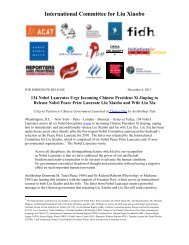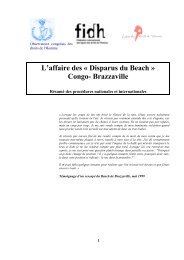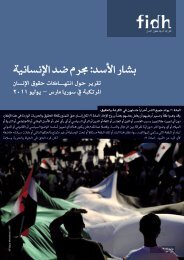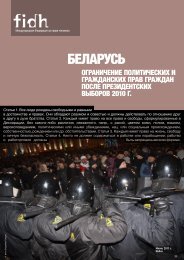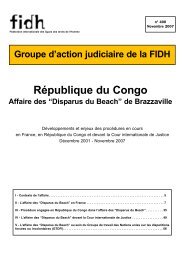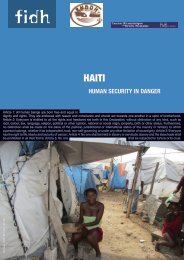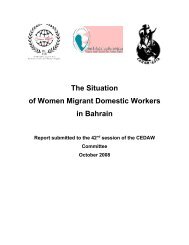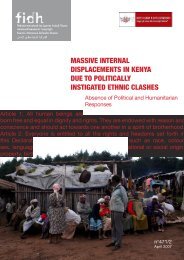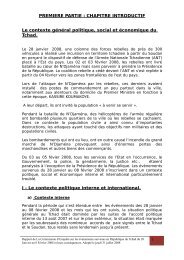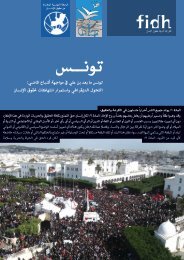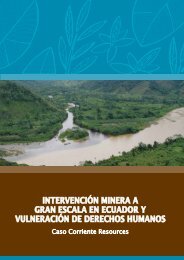KYRGYZStAN - FIDH
KYRGYZStAN - FIDH
KYRGYZStAN - FIDH
- No tags were found...
Create successful ePaper yourself
Turn your PDF publications into a flip-book with our unique Google optimized e-Paper software.
y police officers. A. Askarov was held at the Bazar-Korgon police station where the policemanwho had been killed during the events had worked and where several others whohad been injured continued to work. In addition, A. Askarov is of Uzbek origin. His lawyerand the members of his family were threatened, in particular when they wanted to visithim in detention.It is strongly suspected that the charges made against A. Askarov are politically motivatedand are intended to curb his human rights activities. Prior to his arrest, Azimjan Askarovwas actively involved in collecting evidence concerning violent attacks on his village duringthe inter-ethnic violence that occurred in the south of Kyrgyzstan at the beginning ofJune. According to certain people, A. Askarov filmed the violations, including the policefailure to intervene to stop the acts of violence. He had previously worked for several yearsreporting on prison conditions and the treatment of detainees.Several human rights NGOs called for the charges against A. Askarov to be dropped andfor his release. This request was ignored and a hearing was held at the Bazar-Korgon districtcourt on September 6, 2010. Although the crime of which he is accused was committedin Bazar-Korgon, Kyrgyz officials decided to organise the trial in the village of Nookendue to the aggressive behaviour of Sulaimanov’s relatives. However, Nooken is locatedonly 15 km from Bazar-Korgon, which enabled the friends and relatives of Sulaimanovto continue using pressure. During the hearing, the family of the deceased policemandirectly threatened the defenders of A. Askarov and his friends and relatives. The lawyerof A. Askarov requested a medical examination of his client, who appeared at the hearingwith a black eye. A. Askarov refused the medical examination, explaining that he had notbeen beaten. When questioned about the Askarov case, the deputy General Prosecutorof Kyrgyzstan answered that “he knew he was guilty”, despite presumption of innocence.Regarding the blows he had received, these had apparently occurred in fights precedingthe arrest. NGOs expressed suspicions that torture and physical violence had been usedagainst A. Askarov 85 .A.Askarov was sentenced to life imprisonment on September 15, 2010. This heavy sentence,in spite of the fabricated character of the investigation and the trial, and which wasdenounced by all the international human rights NGOs, seriously tarnishes the reputationof the new Kyrgyz state that is under construction and reinforces fears concerning thedemocratic future of the country.The interrogation of Tolekan Ismailova and Aziza Abdirasulova 86Since the inter-ethnic clashes in June, acts of intimidation have been committed againstseveral human rights defenders. On June 28, Ms. Tolekan Ismailova and Ms. Aziza Abdirasulova,respectively Directors of the NGOs Citizens Against Corruption and KylymShamy, <strong>FIDH</strong> member leagues, were summoned to the office of the Osh regional courtto be heard as witnesses in a case of “mass disorders” (Art. 233 of the Criminal Code ofthe Kyrgyz Republic) and “mass murder” (Art. 97). <strong>FIDH</strong> Vice President, Aliaksandr Bialiatski,who was present in Osh at the time of the mission, accompanied Ms. Ismailova andMs. Abdirasulova to the interrogation. He subsequently said that: “Ms. Ismailova and Ms.Abdirasulova carried out vital research in the Osh region, documenting a great number ofviolations and fighting to get the authorities to understand the scope of the situation. Theyhad just asked the Minister of Defence and the government’s special envoy to the southregion, Ismail Isakov, to allow them to enter the Osh provisional detention area. Their summonsmust be seen as a warning to local human rights defenders to stop documentingviolations committed by the security forces”. Tolekan Ismailova and Aziza Abdirasulovawere each interrogated separately for one and a half hours, in the presence of their lawyer.The interrogation concerned information published by the website www.24.kg, whichreferred to Ms. Ismailova and Ms. Abdirasulova as its sources. The information mentioned85. Interview with V.G. Ivanov, 25.06.2010.86. Appeal by the Observatory for the Protection of Human Rights Defenders, June 30, 2010,http://www.fidh.org/Open-Letter-to-the-authorities-Deep-concern,8235.that 20 people had been killed during a police “special operation” in Nariman village in theKarasuu district on June 21, 2010. The journalist who wrote the article reported that theinformation had been given to him by Tolekan Ismailova.Threats against Tolekan Ismailova lead to her exileIn addition, threats continued against Tolekan Ismailova and members of her family andbecame worse, with serious threats of murder. The Mayor of Osh had accused T. Ismailovaof not being “a Kyrgyz”, saying “How can you talk about an Uzbek genocide” even thoughshe had never used these words in public. Furthermore, on June 28, Felix Kulov, presidentof the Ar-Namys party, and other people warned CAC members that “criminal gangs wereout to hunt Tolekan Ismailova” and that she might be “abducted”. He advised her to beextremely careful. On the same day, Roza Otunbaeva, the interim President of Kyrgyzstan,called Tolekan Ismailova and suggested that she should leave Osh immediately. When Ms.Ismailova learned that people had been making enquiries about the physical appearanceof her children and grandchildren, she preferred to leave Kyrgyzstan temporarily, just afterthe end of the <strong>FIDH</strong> mission.Defamation of Aziza AbdirasulovaFollowing publication of the Human Rights Watch report on August 17, 2010, Directorof “Kylym Shamy” Aziza Abdirasulova decided to file a complaint for defamation againstTursunbek Akun, the Kyrgyzstan Ombudsman. The latter had stated that Ms Abdirasulovahad deliberately given partial (pro-Uzbek) information to HRW representatives. The DeputyMayor of Osh had accused Ms. Abdirasulova of being a traitor and a spy who helped foreigners.The city prosecutor has taken no action following these allegations.VI.2 Problems faced by the independent mediaIn this context of uncertainty and violence, pressure is also put on the media. The Interimgovernment has taken control of several media bodies and launched nationalisation procedures.Journalists of Uzbek origin are suspected of working to destabilise the country.In the absence of independent investigations, journalists who are considered suspect arethe target of police and administrative pressure that is damaging to the restoration ofpublic confidence.VI.2.1 Control of the mediaThe political blindness of the Interim government is coupled with the wish to control themedia. The new political leaders have tried to minimise the importance of the June incidentsand their effects on inter-ethnic relations in the country. The media policy has probablyled to the development of rumours and uncertainty concerning the real situation inthe country.Daniyar Karimov, a journalist with the www.24.kg agency, sympathetic to Bakiyev, states:“When I started to talk about the south, I received a call to say that no reference must bemade to ethnic names... There was real self-censorship on the subject. It was only whenBeknazarov stated that it was an inter-ethnic conflict that the media started to expressthemselves freely. (…) It is very difficult to do our job of providing information when officialsources are unreliable; when they announce that everything is under control although youcan hear automatic fire in the back ground... Who can you believe or not believe? The authoritieshave tended to deny the problems, taking the line of: “no statements, no facts”.The Health Ministry press centre was the only one to provide information more or lessnormally.”On June 14, the independent news agency Ferghana.ru published a letter that all of themedia received from the authorities concerning the way to handle the events in the south32 / KYRGYZSTAN <strong>FIDH</strong> – KYRGYZSTAN / 33




